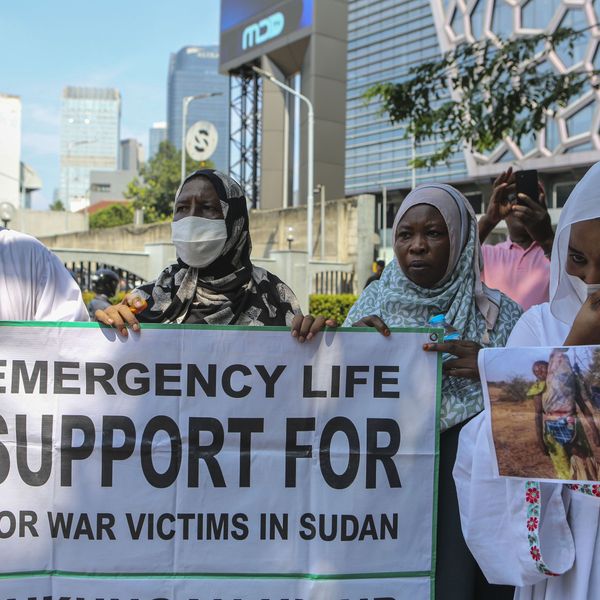The only thing worse than the Obama administration's failing Sudan policy is their failure to recognize it.
The consequence? The people of Darfur are experiencing the horror of the highest levels of violence and displacement since the United States declared Darfur a genocide. The government of Sudan is bombing civilians, blocking international aid to those in need, and preventing an investigation into credible charges of mass rape by its armed forces.
In just the first weeks of 2015 the United Nations has confirmed at least 40,000 people fled their homes -- an average of 5,000 people a week. Yet even as violence surges Sudan's President Bashir is actually demanding the removal of UN peacekeepers -- and the UN is appeasing him by discussing an exit strategy.
Why are these attacks increasing? Two principle reasons: 1) The impunity of Sudan's President Omar al-Bashir who is wanted by the International Criminal Court for genocide, crimes against humanity and war crimes; and 2) the failure of the United States, the United Nations and the international community to respond adequately to this deepening crisis.
The pattern we are witnessing now is eerily similar to what preceded the start of the Darfur genocide more than a decade ago -- the steady escalation of brutal systematic violence against defenseless people as the world -- and those in positions to act -- turn away.
Frustration at seeing this same pattern again was evident during a Capitol Hill hearing held by the Congressional Tom Lantos Human Rights Commission this week. Co-Chairman Rep. Jim McGovern (D-MA) bluntly asked Obama administration officials: "Everyone opposes genocide, but the question is, what are we really doing to stop genocide in Sudan?"
The Administration officials politely testifying thanked the obviously frustrated Co-Chairman for his question. They then proceeded to repeat the Administration's message which can be summarized: Yes, things are bad and getting worse in Sudan, but expect more of the same inaction from us.
But it doesn't have to be this way. There are steps that can be taken now that will make a world of difference.
During my testimony, I outlined four demands that Congress should be making of the Administration: accountability, enhanced sanctions, more international pressure, and protect civilians.
Demand accountability: The United States should hold those countries accountable that aid and abet Sudan's President Bashir who is wanted for genocide by the International Criminal Court. The Administration must break the silence when countries welcome Bashir and our relationship with these countries should be reviewed, including foreign aid. Bashir belongs in the Hague, not on a red carpet.
Enhance sanctions: Existing U.S. sanctions on Sudan need to be enforced. Unless resources are committed for this purpose, sanctions are meaningless. Current sanctions should be expanded to cover more than just crimes in Darfur precisely because the regime's crimes are now being inflicted in other parts of the country.
Increase international pressure: The United States should play a leadership role by pushing the UN Security Council to denounce and demand that Sudan immediately cease attacks on civilians. The United States should also push for sanctions for numerous Security Council resolution violations and should loudly condemn outrageous appointments such as Sudan's membership on the Committee on the Status of Women.
Protect civilians: The UN Peacekeeping Mission in Darfur needs to be not only renewed but held accountable and strengthened. On paper, the Council has given UNAMID a strong mandate, including the use of force to protect civilians. But in reality, Sudan has been allowed to intimidate UNAMID and there has been little accountability from the international community when the mission fails to report or act to protect civilians.
These steps won't be easy. But we know that citizen activism can make change happen. As was the case in 2004, when an administration stalls on taking meaningful actions, it is up to citizens of conscience to take the necessary steps to ensure the people of Sudan are not lost.
Under the banner, Save Darfur, we pushed the U.S. Congress and administration in 2004 to declare that a genocide was underway in Darfur and to place sanctions on the government of Sudan. Our pressure led to the establishment of the UN Peacekeeper mission in Darfur today.
That kind of pressure is required today. The stakes could not be higher for hundreds of thousands of victims of Omar al-Bashir and his government forces.
We simply cannot let the Obama administration and the United Nations sit on the sidelines anymore. It is up to us to join with those under siege.
The United States should be leading the international charge for peace and accountability in Sudan. You can help right now by calling on the U.S. to demand immediate action at the UN to protect the people of Darfur.


